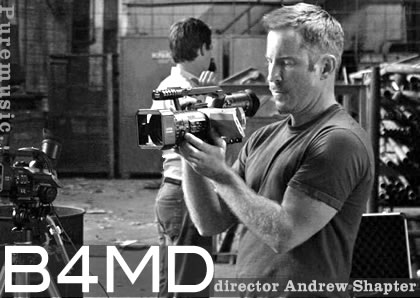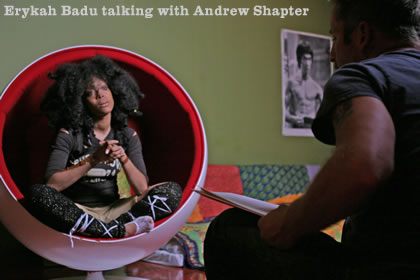
A Conversation with
Andrew Shapter
Puremusic: Andrew, I'm just such a huge fan of B4MD, I barely know where to begin. I really think it's an extraordinary documentary.
Andrew Shapter: Oh, man, I'm glad you like it.
PM: You must be getting an incredible amount of attention since its inception and recent screenings.
AS: I've gotten a lot of e-mails, yes. I've gotten a lot of phone calls and e-mail, and a lot of music being sent that came out of the inspiration of the film. People saw the film, went to the studio and recorded some tracks.
PM: So where does the opening statement in the documentary come from, "The audience is never wrong"?
AS: Well, that's actually coming from the distributor [B-Side] and that that has a lot to do more with independent filmmaking.
PM: Ah.
AS: I guess it's a jab at the highbrow critics, the taste-makers, I guess you would call them. But the audience knows what they like and don't like. I think they use that as a philosophy.
PM: Absolutely. That makes sense, that it comes from the indie film world, right. So without any connections, Andrew, how did you and Joel Rasmussen get the ball rolling? Where did you go, and whom did you see first, and where did that lead, et cetera?
AS: Well, I tend to have a real sort of aggressive nature. I think when I first started the project, I was naive enough to think that people would just automatically want to be in this film because of the nature of the project. It didn't take long to realize that it just wasn't that easy. So I adopted a new strategy, and it was around that time that Joel joined in. And that strategy was just to get out and see these people's shows, and find a way somehow or another to get backstage, and to meet these people in person. In the case of Elvis Costello, I literally walked up to him and asked him to do it.
PM: Wow.
AS: He gave me a commitment, and then he said, "Call my manager." And I think I bugged that manager for six months before I got Elvis to do it. And some of the managers themselves had their own sort of beef or frustration with the state of the industry, the landscape of the industry. And I think a lot of them said, "You know what? We would love to get involved in a project like this, and speak our mind..."
PM: Wow, so sometimes it was the management's passion that was the road in.
AS: A lot of these managers are just like many of us, they're just music fans.
PM: Yeah.
AS: And they're diehard music fans. And they get behind these artists, not for the money, but to support the artist because they care about the music. And so Erykah Badu's manager, Smitty, he was passionate about the project, and got his client, Erykah, excited about the project. That happened a lot. Musicians, when they find out that there's a project going around where they can actually talk about things other than their latest CD or their latest tour, where you can perhaps vent about what you think is wrong, they get interested, because a lot of them never get that opportunity. And we came with that opportunity. And I think they were all surprised to see that there were many musicians just like them.

PM: And in fact, we were hoping like hell that we were going to get a short phoner with Erykah Badu, but she seems to be studio occupied. But I'm led to believe that her interview actually went for a long time, and ended up putting her through a couple of changes?
AS: What I understand, from her directly, is that the movie changed the course of these last three years for her. At the time she saw the film, she was in that mode where she was thinking about her next look, thinking about trends, the hottest producer. And her label and people around her were kind of egging her on to make some wise marketing decisions.
PM: Wow.
AS: And that's just something she got caught up in. And I think that that kind of atmosphere is not healthy for her. I think she feels terribly uncomfortable with that kind of atmosphere. When she saw the film, she cried for quite a long time. It was kind of a first cut. I think she just kind of had an emotional breakthrough, and decided that starting with the moment she saw that film on, she would go back to where she was when she started, and put the music first. And I think it kind of contributed to one of the reasons why her music is not out right now, because she also decided she wanted to take her time.
PM: Right.
AS: And I think we're about to get the best album ever from her, and I'm proud that the movie seems to have had an impact.
PM: You could see, certainly, that she got really choked up at the end when she was saying, "Don't let anybody infiltrate your dream." Hell, so do I, every time. That was unbelievable.

AS: Well, because she's talking from personal experience. There are people out there that come to her and say, "Look what Beyonce is doing, and look that this artist is doing. We need you to do a little bit more of this, and a little less of that, a little bit..." And I think it really interfered with her creative process. And so it's very indicative of the atmosphere today in the big label world. So I think she was speaking from the heart there. And I think the audience picks up on it.
PM: She was also super funny at points, I mean, when she was getting into the, "You got to be butt naked with glitter on you and a beeper"…and "2006 is butt naked Wednesdays" [laughs] and all that. I mean, she's an unbelievably funny chick.
AS: She laughed at me pretty hard when I said, "Okay, so I'm a seventeen year-old little girl. And my dad wants to put me out there and make me a star." I just set the question up just to get her to be silly. I said, "What are we going to need to get there?"
PM: [laughs]
AS: "--to get out there and do it, to make it in this business?" And then she just went on to this monologue right off the top of her head.
PM: Yeah, an incredible artist, man. And, speaking of incredible artists, I watched that opening clip with Billy Preston over and over and over. It's just mind blowing. Where did you unearth that?
AS: It's funny you say that. I was on a radio show this morning, and the guy was talking about how he and his wife played it over and over again last night. I called up a film archive house, a bunch of them, and got stacks and stacks of VHS tapes from TV shows from the '60s and the '70s and the '80s. And I thought, okay, this is going to be fun. And then my buddy and I, a production assistant, who was a roommate at the time, we sat through hours and hours of great footage. I still have this stuff, too, which is great. And I was just looking through some of the Ray Charles footage. Up pops this amazing clip of Billy Preston that my five year-old daughter and I just got a kick out of. And I thought, this is a very universal clip that speaks to everyone. And the talent that it takes to dance and so sing, and the energy, the lyrics, his smile and everything. It came from watching piles and piles of vintage VHS tape.
PM: I mean, that was as good as any James Brown clip I've ever seen.
AS: Who knew that he could dance so well? I don't think a lot of people even realized that Billy Preston was such a dancer.
PM: In all the clips I'd ever seen of him he was sitting down.
AS: Exactly, at the keyboard. I'm glad the movie comes out the year he died, so a lot of people can gain an appreciation for him again.
PM: Yeah. What a sad event, I mean, he was just a remarkable ambassador.
And speaking of ambassadors, I mean, Bonnie Raitt was an unbelievable one for music in this film. How did you find working with her, and how did you get next to her?

AS: That was something for which Joel and I put out some feelers, and put out an invitation a long, long time before she came in, and we pretty much forgot about it. And then one day, Joel calls me and says, "Hey, Bonnie Raitt's manager called back and said they think this project is good. They've been hearing a lot of buzz about it in L.A. They want to do it." And she was a delight. I mean, there's a woman that is so humble that you would never know that she's been a multi-Grammy winning international selling star.
PM: Right.
AS: And she just had that sort of like neighborly, best friend, talk about anything else but herself type of person.
PM: Yeah, she's so grown up and so right-sized. It's just always really refreshing when people are. continue
print pdf of interview + review puremusic home